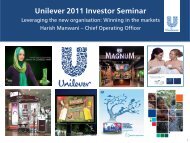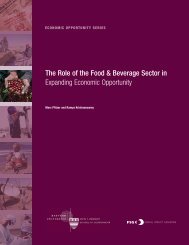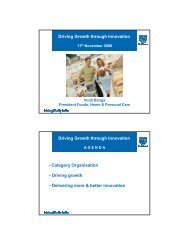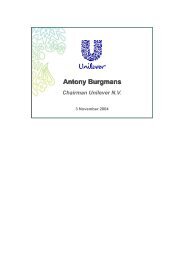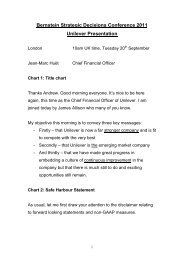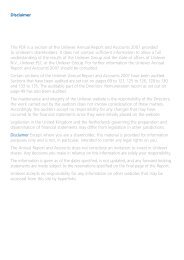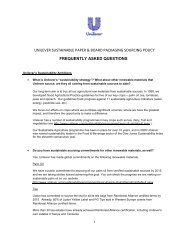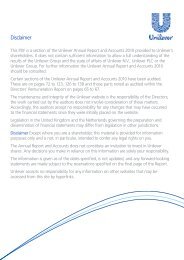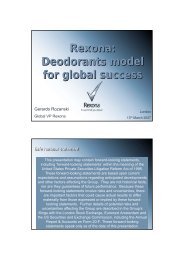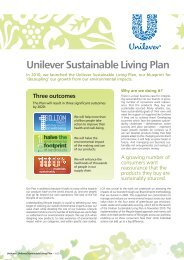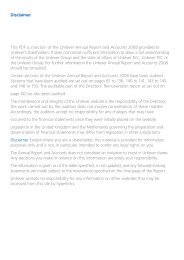Company Accounts - Unilever
Company Accounts - Unilever
Company Accounts - Unilever
You also want an ePaper? Increase the reach of your titles
YUMPU automatically turns print PDFs into web optimized ePapers that Google loves.
Financial statements<br />
Further statutory and other information <strong>Unilever</strong> PLC<br />
Directors’ Report of PLC and limitations of liability<br />
For the purposes of the Companies Act 2006, the Directors’<br />
Report of <strong>Unilever</strong> PLC for the year ended 31 December 2009<br />
comprises this and the following page and the information<br />
contained in the Report of the Directors on pages 2 to 62 which<br />
includes the <strong>Company</strong>’s position on environment and corporate<br />
responsibility matters, the Directors’ Remuneration Report in<br />
respect of Directors’ interests in shares or debentures of the Group<br />
on pages 72 and 73, Dividends on page 93, Principal group<br />
companies and non-current investments on pages 131 and 132,<br />
Significant shareholders of PLC as disclosed on page 144, and<br />
Financial instruments and Treasury risk management on page 104.<br />
The information required to be given pursuant to Section 992 of<br />
the UK Companies Act 2006 is covered elsewhere in this Annual<br />
Report.<br />
The Directors’ Report has been drawn up and presented in<br />
accordance with and in reliance upon English company law and<br />
liabilities of the Directors in connection with that report shall be<br />
subject to the limitations and restrictions provided by such law.<br />
Under the Companies Act 2006, a safe harbour limits the liability<br />
of Directors in respect of statements in and omissions from the<br />
Directors’ Report. Under English Law the Directors would be liable<br />
to <strong>Unilever</strong> (but not to any third party) if the Directors’ Report<br />
contains errors as a result of recklessness or knowing misstatement<br />
or dishonest concealment of a material fact, but would not<br />
otherwise be liable.<br />
Business review<br />
The UK Companies Act 2006 requires <strong>Unilever</strong> PLC to set out in<br />
this report a fair review of the business of the Group during the<br />
financial year ended 31 December 2009 including a description<br />
of the principal risks and uncertainties facing the Group and an<br />
analysis of the position of the Group’s business at the end of the<br />
financial year, known as a ‘Business review’.<br />
The information that fulfils the current Business review<br />
requirements can be found on the following pages of this Annual<br />
Report which are incorporated into this report by reference:<br />
• a description of the principal risks and uncertainties facing the<br />
Group see pages 30 to 34;<br />
• the development and performance of the Group’s business<br />
during the year see pages 37 to 46;<br />
• the position of the Group’s business at the end of the year see<br />
pages 40 and 81;<br />
• key performance indicators see page 25 and 26;<br />
• other key indicators see pages 25 and 26;<br />
• main trends and factors likely to affect the future development,<br />
performance and position of the Group see page 30;<br />
• environmental matters and policy, including the impact of the<br />
Group’s business on the environment see pages 20 to 21;<br />
• employee matters and policy see pages 14 to 15, 28 and also<br />
below; and<br />
• a statement that the Directors do not believe that there are any<br />
contracts or other arrangements which are essential to the<br />
business of the Group is given on page 59.<br />
Employee involvement and communication<br />
<strong>Unilever</strong>’s UK companies maintain formal processes to inform,<br />
consult and involve employees and their representatives. We<br />
recognise collective bargaining on a number of sites and engage<br />
with employees via the Sourcing Unit Forum including officer<br />
142 <strong>Unilever</strong> Annual Report and <strong>Accounts</strong> 2009<br />
representation from the three recognised trade unions. Our sites<br />
use tools such as Total Productive Maintenance which rely heavily<br />
on employee involvement, contribution and commitment.<br />
A National Consultative Council covering employees and<br />
management representatives exists to provide a forum for<br />
discussing issues relating to the United Kingdom. A European<br />
Works Council, embracing employee and management<br />
representatives from countries within Europe, has been in<br />
existence for several years and provides a forum for discussing<br />
issues that extend across national boundaries.<br />
The company carries out regular and wide-ranging monitoring<br />
surveys providing valuable insight into employee views, attitudes<br />
and levels of engagement.<br />
The Directors’ Reports of the United Kingdom group companies<br />
contain more details about how they have communicated with<br />
their employees during 2009.<br />
Equal opportunities and diversity<br />
Under the umbrella of our Code of Business Principles, <strong>Unilever</strong><br />
aims to ensure that people with disabilities, and other underrepresented<br />
groups, are given the same training, development and<br />
prospects as other employees. Every effort is also made to retrain<br />
and support employees who become disabled while working<br />
within the Group.<br />
The company continues to review ways in which greater diversity<br />
can be achieved in recruitment and selection. We have put in<br />
place policies which promote the achievement of diversity in our<br />
business and we review these regularly. For example, <strong>Unilever</strong> UK<br />
provides policies on home working, flexible working, maternity<br />
and paternity leave, child care provision and career breaks, which<br />
help us to meet the objective of greater employee diversity.<br />
Charitable and other contributions<br />
<strong>Unilever</strong> collates the cost of its community involvement activities<br />
using the London Benchmarking Group model. The model<br />
recommends the separation of charitable donations, community<br />
investment, commercial initiatives in the community and<br />
management costs relating to the programme of activity.<br />
During 2009 UK group companies made a total contribution of<br />
£7.8 million, analysed as follows:<br />
• Charitable donations: £0.4million<br />
• Community investment: £1.1 million<br />
• Commercial initiatives in the community: £6.1 million<br />
• Management costs: £0.2 million<br />
No donation or contribution was made or expenditure incurred for<br />
political purposes.<br />
Supplier payment policies<br />
Individual operating companies are responsible for agreeing the<br />
terms and conditions under which business transactions with their<br />
suppliers are conducted. The Directors’ Reports of the United<br />
Kingdom operating companies give information about their<br />
supplier payment policies as required by the UK Companies Act<br />
2006. PLC, as a holding company, does not itself make any<br />
relevant payments in this respect.




